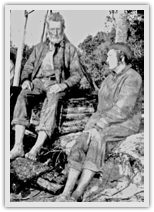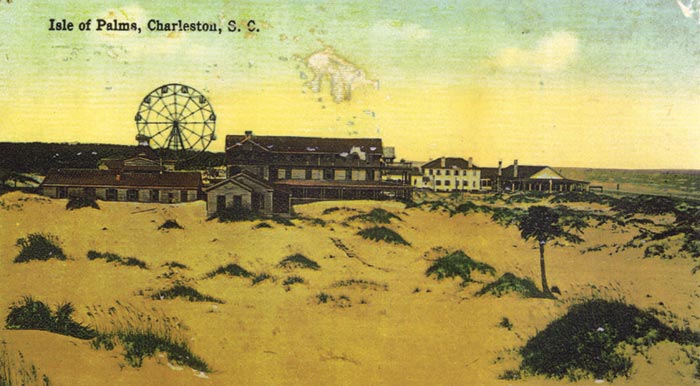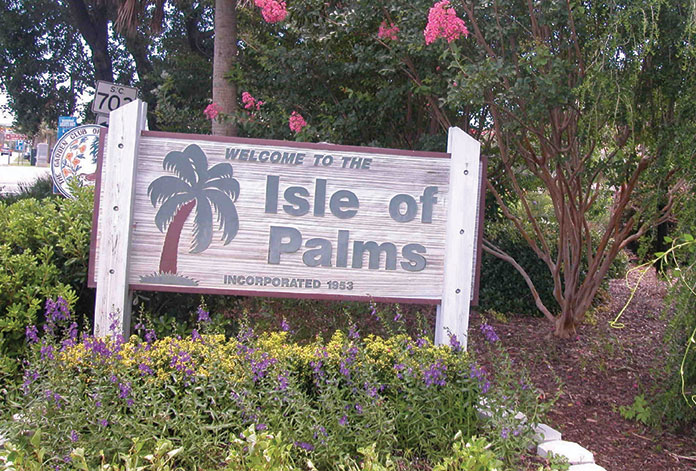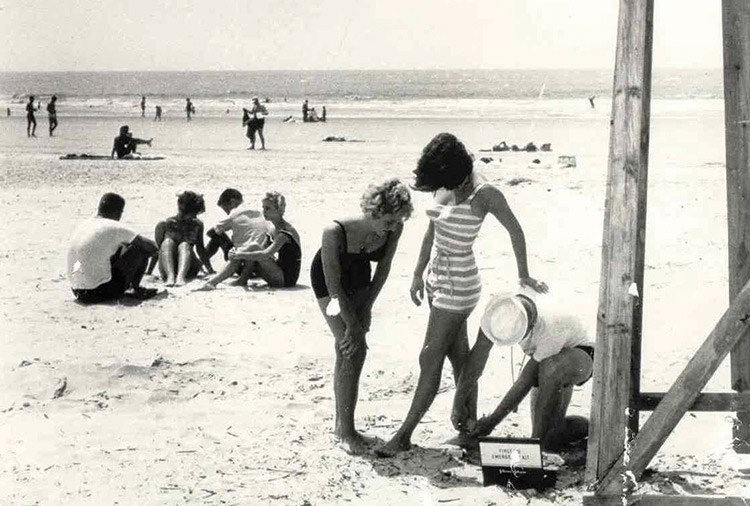

Legend still lingers on a tiny barrier island only 200 yards off the Isle of Palms. In the early 1930s, a man and his wife lived in self-exile on Goat Island, without electricity or water, choosing to turn their backs on civilization forever. The island remains a place of rustic solitude – a precious, slender slice of land beyond the reach of streetlights and bus stops. The legend of Goat Island has been passed down through generations of locals who sometimes share it with worthy tourists.
The legend of the Goat Man emerged in 1931, when a Charleston butcher, Henry Holloway, and his wife, Blanche, decided to free themselves from the rules, regulations and stresses of modern day society. Repelled by the intrusion of what was labeled as progress, the Holloways retreated from the real world as we know it, into a timeless, peaceful life of seclusion on their own deserted island, which they shared with a herd of goats.
There, alone, in a driftwood-covered hole in the ground, sheltered only by palm fronds, they claimed squatter’s rights over the island – the sole living heirs to the virgin paradise of Goat Island’s undeveloped beaches and marshlands.
The Goat Man and his wife learned to accept what God provided them with, drinking rainwater and eating whatever grew on the island. They lived in solitude under the aimless canopy of tree limbs and palms that provided them shelter in the rainy season, shade in the hot, sweltering summers and firewood in the cool, wet island winters.
While their nearby neighbors donned fancy new shoes and Sunday clothes, they wore only their tans. They denied a domesticated existence, refusing to live under the watchful eye of any community. They didn’t go to church, work or networking groups. Once they abandoned scheduled society, they never had to wake up to the sound of an alarm.
Instead, they rose to the whispering wind and saw their days end with pink sunsets over trouble-free waters.
The Goat Man and his wife collected the discarded debris that drifted onto the shores and into their lives. They eventually accepted handouts from people on passing yachts. The Holloways were always gracious and courteous to those who offered sandwiches and leftovers from a day of picnicking on nearby Dewees Island.
During the Goat Man’s 32 years of self-imposed exile, people in nearby communities who didn’t have to scavenge for their food knew the Holloways were out there, across the waterway, but, for the most part, they denied the possibility that the Holloways’ simple nomadic lifestyle might have been perfectly sane. The famous Charleston rumor mills spread the seeds that the Goat Man and his wife were out of their minds and out of touch with civilization.
Over the years, the legend of the secretive Goat Man and his wife has been told right around bedtime, at dusk, so that children and adults who are a little scared to explore unique possibilities during the day can dream of the unbelievable at night. Little children thought the island was haunted because their parents told them strange voices echoed through the trees and in the thick underbrush. Some children dared to challenge their fears, crossing the water into the unknown, only to discover that the alien sounds were the soulful singing of a content, solitary man.
In 1961, after 30 years of living in the natural elements, the Goat Man accepted a small hut as a Christmas gift from generous neighbors who were concerned that the Holloways were too old to live an unsheltered life. But their existence soon changed. The Goat Man caught pneumonia and died, leaving Blanche to carry on the legend and tradition alone.
Blanche survived Henry in solitude on Goat Island for almost a year. She died from burns suffered in a fire caused by a wood-burning stove that also was a handout from civilized do-gooders. According to the legend, the Goat Man and his wife were buried together in the Lutheran Church Cemetery in Mount Pleasant. Their paradise was overrun by looters searching for hidden wealth and buried treasure. But the Goat Man’s paradise wasn’t measured by material things. There was nothing looters could take, either before or after the Holloways passed on. Their wealth was their ability to challenge the unknown and to abide by the laws of Nature.




I would really love to get a hard copy of this article! My family and I currently live on Goat island and I’d love to frame hang up this in our house!
do you still live on Goat Island.? what is that like on a day to day basis?
I lived on the IoP in the late 1950’s. My buddies and I would go down to the end of 25th avenue (which then was where the town dump was located), and fish in the Intracoastal waterway. Sometimes we would see the Goat man, out walking his goats. He looked a little like an Old Testament prophet, with a long staff, ragged flowing clothes, a beard, and about 20 goats.
We didn’t know anything about him, he was a little bit scary looking. I don’t think the island had a name at that time, it was later named Goat Island.. Other than the goat man and his wife, I don’t think any one lived on the island at that time. Same for Dewees, Capers and Bull.